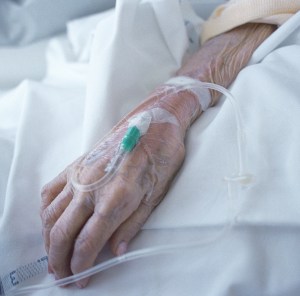
Image by © Philippe Dureuil/ès Photography/Corbis
Antipsychotic drugs, which are often prescribed to treat aggression in patients with dementia, may significantly increase risk for potentially fatal pneumonia in the elderly, according to a new study highlighted by the BBC from researchers at Erasmus University Medical Center in the Netherlands. The study, published in the Annals of Internal Medicine, compared medical records for more than 1,900 patients over age 65—258 of whom had been diagnosed with pneumonia and 1,686 did not have the illness. Nearly one in four patients with pneumonia died within a month of diagnosis, the BBC reports. When researchers analyzed health records, accounting for prescriptions taken by the patients, they found that patients taking antipsychotics had twice the risk for pneumonia compared with those not taking the drugs. The study authors found that the risk was only slightly diminished for patients taking newer forms of antipsychotic drugs, and for all patients on antipsychotic medication the risk was most significant early in treatment and with higher doses of the drugs.
A 2008 study published in the Journal of the American Geriatrics Society first reported the association between antipsychotic drugs and elevated risk for pneumonia, suggesting that older patients taking the medication faced a 60% higher risk for pneumonia. The findings of that earlier study, coupled with this most recent research, are particularly alarming considering that some 40% of patients in nursing home and assisted living facilities may be prescribed antipsychotic drugs. The high risk for pneumonia should give doctors pause, Dr. Steve Field, chair of the Royal College of General Practitioners, told the BBC:
“Anti-psychotics are prescribed too frequently without doctors thinking about the consequences… This paper yet again gives us evidence why we should not prescribe them unless absolutely necessary and if you do you should closely monitor the patient.”
The way in which antipsychotic drugs may increase pneumonia risk is not fully understood, but authors of the Dutch study speculate that it could have to do with altered function of histamine receptors. Whatever drives the relationship between antipsychotics and pneumonia risk, it isn’t entirely clear that the drugs are truly effective for most patients. As the BBC points out, a review conducted last year in the U.K. found that some 180,000 elderly patients are prescribed the medications each year, but only 36,000—or 20%—benefit from the drugs.

